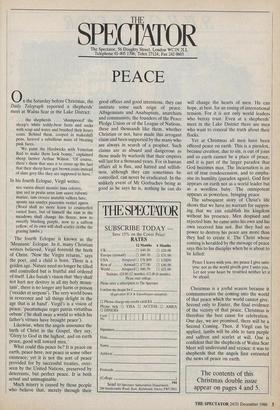SPECT THE AT OR The Spectator, 56 Doughty Street, London WC1N 2LL
Telephone 01-405 1706; Telex 27124; Fax 242 0603
PEACE
On the Saturday before Christmas, the Daily Telegraph reported a shepherds' meet at Walna Scar in the Lake District:
. . . the shepherds . . . 'shampooed' the sheep's white teddy-bear faces and socks with soap and water and brushed their hoary coats. Behind them, cooped in makeshift pens, heaved a rebellious mass of bleating pink faces.
'We paint the Herdwicks with Venetian Red to make them look bonny,' explained sheep farmer Arthur Wilson. 'Of course, there's them that uses it to cover up the fact that their sheep have got brown coats instead of slate grey like they are supposed to have.'
In his fourth Eclogue, Virgil writes: nec varios discet mentiri lana colores, ipse sed in pratis aries jam suave rubenti murice, jam croceo mutabit vellera luto; sponte sua sandyx pascentis vestiet agnos. (Wool shall no more learn to counterfeit varied hues, but of himself the ram in the meadows shall change his fleece, now to sweetly blushing purple, now to a saffron yellow; of its own will shall scarlet clothe the grazing lambs.) The fourth Eclogue is known as the 'Messianic' Eclogue. In it, many Christian writers believed, Virgil foretold the birth of Christ. 'Now the Virgin returns,' says the poet, and a child is born. There is a golden age. Nature need no longer be tilled and controlled but is fruitful and ordered of itself. Like Isaiah's vision that 'they shall not hurt nor destroy in all my holy moun- tain', there is no longer any harm or poison ('occidet et serpens'). The very world bows in reverence and 'all things delight in the age that is at hand'. Virgil's is a vision of peace: `pacatumque reget patriis virtutibus orbem' ('he shall sway a world to which his father's virtues have brought peace').
Likewise, when the angels announce the birth of Christ in the Gospel, they say, 'Glory to God in the highest, and on earth peace, good will toward men.'
What could this peace be? It is peace on earth, peace here, not peace in some other existence; yet it is not the sort of peace provided for by successful treaties, over- seen by the United Nations, preserved by deterrents, but perfect peace. It is both actual and unimaginable.
Much misery is caused by those people who believe that, merely through their
good offices and good intentions, they can institute some such reign of peace. Albigensians and Anabaptists, anarchists and communists, the founders of the Peace Pledge Union or of the League of Nations, these and thousands like them, whether Christian or not, have made this arrogant claim and been supported by the many who are always in search of a prophet. Such claims are as absurd and dangerous as those made by warlords that their empires will last for a thousand years. For in human affairs all is flux, and hatred and selfish- ness, although they can sometimes be controlled, can never be eradicated. In the unlikely event of Mr Gorbachev being as good as he says he is, nothing he can do will change the hearts of men. He can hope, at best, for an easing of international tension. For it is not only world leaders who betray trust. Even at a shepherds' meet in the Lake District there are men who want to conceal the truth about their flocks.
Yet at Christmas all men have been offered peace on earth. This is a paradox, because creation, due to sin, is out of joint and so earth cannot be a place of peace; and it is part of the larger paradox that God becomes man. The Incarnation is an act of true condescension, and to empha- sise its humility (paradox again), God first appears on earth not as a world leader but as a wordless baby. The omnipotent appears as powerless, bringing peace.
The subsequent story of Christ's life shows that we have no warrant for suppos- ing, that we can establish his kingdom without his presence. Men despised and rejected him: he came unto his own and his own received him not. But they had no power to destroy his peace any more than they had to create it. The Christ whose coming is heralded by the message of peace says this to his disciples when he is about to be killed: Peace I leave with you, my peace I give unto you: not as the world giveth give I unto you. Let not your heart be troubled neither let it be afraid.
Christmas is a joyful season because it commemorates the coming into the world of that peace which the world cannot give. Second only to Easter, the final evidence of the victory of that peace, Christmas is therefore the best cause for celebration. One day, we are promised, there will be a Second Coming. Then, if Virgil can be applied, lambs will be able to turn purple and saffron and scarlet at will. One is confident that the shepherds of Walna Scar Meet will understand and rejoice: it was to shepherds that the angels first entrusted the news of peace on earth.










































































































 Previous page
Previous page